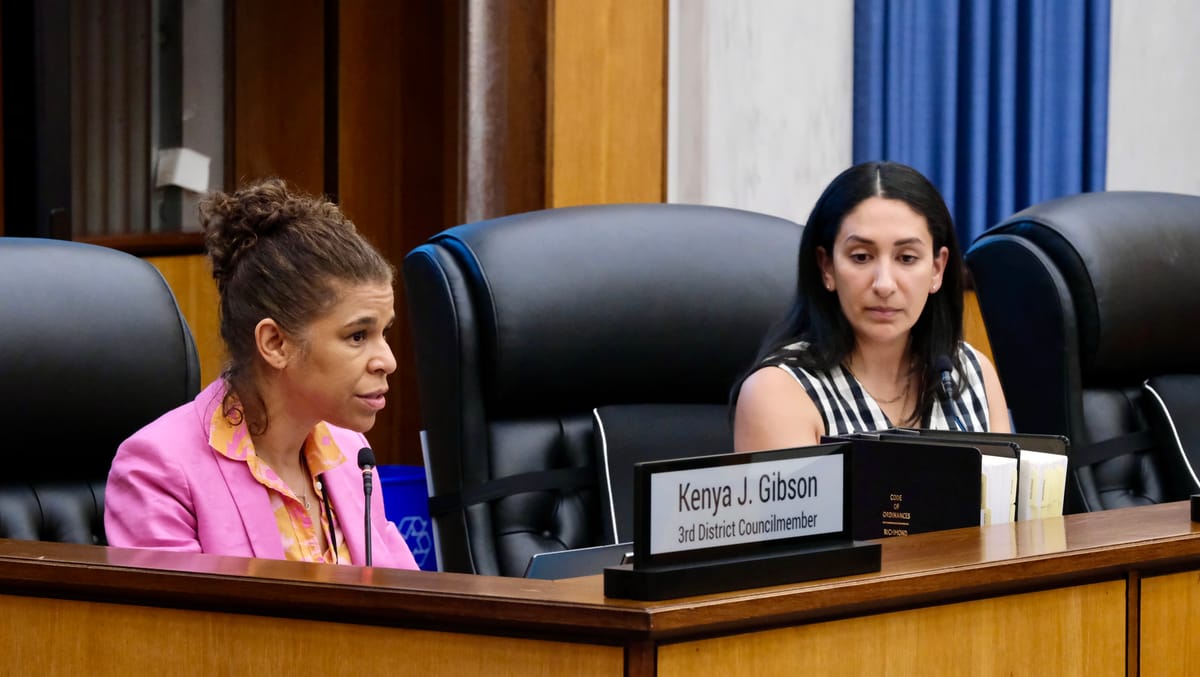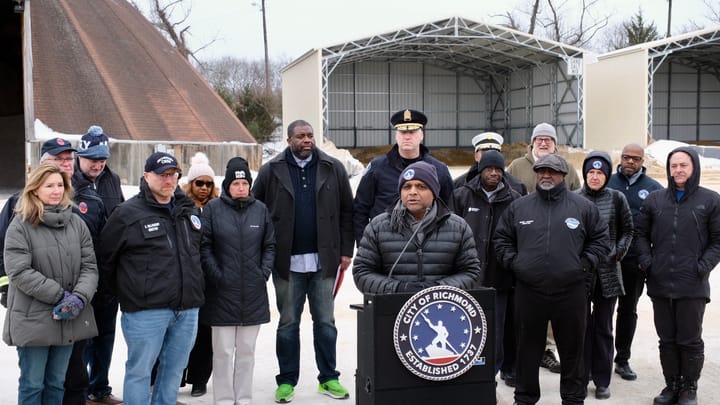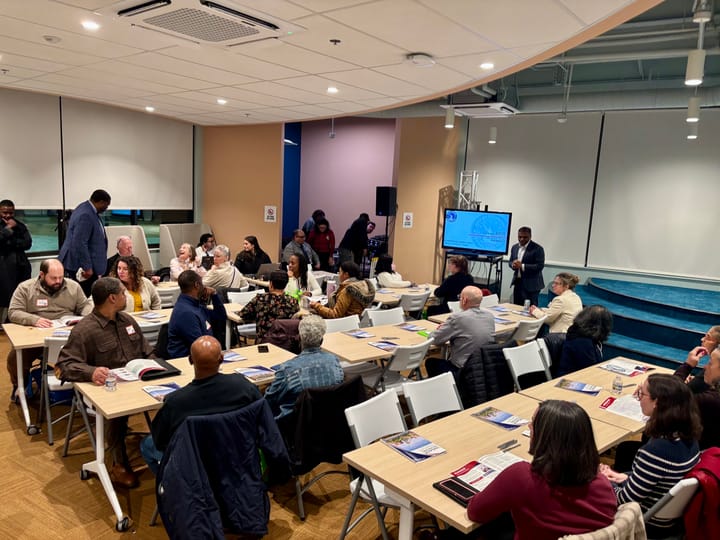Gibson pushing for robust FOIA library in package of City Hall transparency measures

After running on more government transparency in the 2024 elections, first-term Richmond City Councilor Kenya Gibson is trying to deliver on those promises by pushing to make more city records and data available online.
Gibson (3rd District) introduced three transparency-related proposals this month that the Council is expected to take up this fall.
The most sweeping plan would require the city to maintain an online Freedom of Information Act library allowing anyone to see requests the city receives for government records, how the city responds and copies of any documents released to the requester. The city would also have to disclose how much it’s charging to fulfill each request.
“I am pushing that everything be included in this FOIA library,” Gibson said in a recent interview. “There’s clearly a history of a lack of transparency.”
Making the entire FOIA process available for anyone to observe online would be a significant departure for a city that’s been sued several times in recent years for allegedly lackluster adherence to open government laws. Connie Clay — who previously handled FOIA requests for the city before she was fired in 2024 — is currently suing, claiming she was unfairly pushed out of her job after clashing with other city officials about releasing documents.
Many governments, law enforcement agencies and universities use FOIA software to track and respond to records requests. But the idea of putting all the underlying documents online is relatively new.
The city of Newport News already has a similar system, publishing an archive of FOIA requests related to building code violations, environmental assessments, surveillance footage and other municipal records.
Gibson, who previously served on the Richmond School Board, is one of the most outspoken members of the new-look City Council seated at the start of the year. Since taking office, she has sharply questioned the way the city operates and has repeatedly called for more city business to be done in full view of the public. That crusade has sometimes drawn pushback from more veteran city officials who see some of Gibson’s requests as unreasonable or unworkable.
In a statement to The Richmonder, Mayor Danny Avula said he doesn’t support the proposal as written, but is a “huge fan” of the concept and willing to work with Gibson on refining it.
“I’m worried about the unintended consequences of requiring every FOIA request and response to be published online,” Avula said. “Some FOIA requests are related to personal issues and disputes that are not covered by a legal FOIA exemption and are not in the public interest to publish, as they fundamentally concern private matters rather than the business of the city or matters of policy.”
Avula also campaigned heavily on transparency last year. At a city retreat in March, he said people in government shouldn’t be “afraid” of FOIA.
Asked for an example of personal information that the mayor wouldn’t want to see published in the proposed FOIA library, administration officials pointed specifically to 911 calls. Officials gave examples of two recent 911 calls, one made by a child who said “Mommy can’t wake up” and another from a woman being beaten and trying to get help.
Virginia’s FOIA law has numerous exemptions officials can use to avoid disclosing truly sensitive information that could be seen as an invasion of privacy. Emergency calls for criminal matters are exempt from mandatory release, as are all investigative police files. Portions of non-criminal 911 calls can also be withheld if they contain personal or private information. It wasn’t clear Thursday if the city did or could have used those exemptions to avoid releasing the 911 calls cited as examples.
In a memo to the Council, the administration said the proposed FOIA library could cost up to $350,000 a year, largely because of additional staffing needs. The administration said three new full-time FOIA librarians would have to be hired to “review each proposed response for potential disclosure of sensitive or personally identifiable information.”
The Avula administration has been working on its own plan for a FOIA library, but has yet to roll it out. During the January water outage, the city created an online “reading room” for documents related to the crisis. However, that archive contained just a few documents and was not a comprehensive set of records released about the water incident.
The city said it handles around 5,500 FOIA requests a year, and publishing them all online could mean 30 minutes to an hour of additional staff time per FOIA request.
The Avula administration is already in the process of upgrading the city’s FOIA system. According to city records, officials signed a nearly $35,000 contract last month with JustFOIA, which makes software for managing records requests.
Gibson said her intention is straightforward: To take what the city is already releasing under FOIA and “put it online so the public has access to it.” She said she would have concerns with any version of a FOIA library that would let officials pick what gets published and what doesn’t.
“When it’s not everything, it can become very subjective,” Gibson said. “And that’s exactly what I’m trying to avoid.”
The Richmonder is powered by your donations. For just $9.99 a month, you can join the 1,000+ donors who are keeping quality local journalism alive in Richmond.
First-term Councilor Sarah Abubaker (4th District) — who has also pushed for City Hall to be more transparent— has signed on as a co-sponsor to the three measures Gibson is championing.
In an interview, Abubaker said she understands it takes time and effort for city staffers to pull and review records in response to FOIA requests. Once that’s done, she said, it makes sense to make the records accessible to others who might be interested.
“Once the request has been fulfilled, it does seem pretty draconian to ask somebody else to pay for that request to be filled again,” Abubaker said.
Open data portal
Gibson is also proposing changes to the city’s open data portal. She’s filed an ordinance that would require more comprehensive information on city contracts and purchasing to be published on the data portal, and would prevent the city from charging fees for FOIA requests seeking information that’s required to be on the portal.
The city created the open data portal in 2017, but it’s been allowed to wither over the years. The Council is supposed to receive quarterly and yearly reports on open data initiatives, but those reports aren’t being filed. A recent Council review found the open data reporting initiative is “unstaffed.”
Conflict-of-interest disclosures for board members
A third proposal would require more members of Council-appointed boards and commissions to file economic disclosure forms to avoid conflicts of interest. Elected officials in Virginia are required to file forms listing their sources of income, investments and real estate holdings, a resource that makes it easier for the public and the press to see when someone may be voting on a matter that could affect them financially.
The disclosure rules are less clear for the variety of boards and commissions made up of unelected volunteers or appointees who still hold sway over the use of public dollars.
The expanded rule Gibson is proposing would apply mainly to boards with responsibility over $10,000 or more in public funds per budget year. That would include the Richmond Economic Development Authority, Richmond Metropolitan Transportation Authority, Richmond Redevelopment and Housing Authority, Capital Region Airport Commission and Affordable Housing Trust Fund Supervisory Board. For some of those boards, members are already required to disclose their financial interests.
The three transparency proposals are scheduled to be taken up by a Council committee on Sept 24.
Contact Reporter Graham Moomaw at gmoomaw@richmonder.org
The Richmonder is powered by your donations. For just $9.99 a month, you can join the 1,000+ donors who are keeping quality local journalism alive in Richmond.






